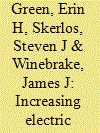|
|
|
Sort Order |
|
|
|
Items / Page
|
|
|
|
|
|
|
| Srl | Item |
| 1 |
ID:
127287


|
|
|
|
|
| Publication |
2014.
|
| Summary/Abstract |
It is widely accepted that interventions designed to promote household energy efficiency, like insulation, central heating and double glazing, can help to reduce cold-related illnesses and associated stress by making it easier for residents to keep their homes warm. However, these interventions may also have a detrimental effect on health. For example, the materials used or lower ventilation rates could result in poorer indoor air quality. The present research sought to systematically quantify the impact of household energy efficiency measures on health and wellbeing. Thirty-six studies, involving more than 33,000 participants were meta-analysed. Effect sizes (d) ranged from ?0.43 (a negative impact on health) to 1.41 (a substantial positive impact on health), with an overall sample-weighted average effect size (d+) of 0.08. On average, therefore, household energy efficiency interventions led to a small but significant improvement in the health of residents. The findings are discussed in the context of the health improvements experienced by different groups of participants and the study design factors that influence health outcomes. The need for future studies to investigate the long term health benefits of interventions designed to promote household energy efficiency is identified.
|
|
|
|
|
|
|
|
|
|
|
|
|
|
|
|
| 2 |
ID:
127282


|
|
|
|
|
| Publication |
2014.
|
| Summary/Abstract |
Plug-In Electric Vehicles (PEVs) provide an opportunity for reducing energy use and emissions in the transportation sector. Currently, a number of federal policies are in place to incentivize deployment of PEVs to mainstream consumers with demographics and vehicle attribute preferences most common to today's new vehicle purchasers. This article argues that policies intending to give PEVs a foothold in the market should not focus on mainstream consumers and should instead focus on niche markets-specifically carsharing and postal fleets-and early adopters including green consumers. Two arguments can be made in support of eliminating the mainstream market bias of current policies toward a policy of cultivating niche markets. The first is efficiency: so far PEV policies featuring a mainstream market bias have proven to be inefficient and costly. The second is effectiveness: it is becoming increasingly evident that PEV policies would be more effective in achieving potential societal benefits if they focused on early adopters and niche markets using such approaches as strategic niche management, accessible loans and financing, and appropriately targeted incentives. PEV policies focused on early adopters and niche markets would create complementary system effects that will lead to increased PEV market penetration and realization of intended societal benefits.
|
|
|
|
|
|
|
|
|
|
|
|
|
|
|
|
| 3 |
ID:
127289


|
|
|
|
|
| Publication |
2014.
|
| Summary/Abstract |
Better methods of characterizing and addressing heterogeneity in preferences and decision making are needed to stimulate reductions in household greenhouse gas emissions. Four residential energy efficiency programs were delivered consecutively in the Region of Waterloo, Canada, between 1999 and 2011, and each offered a unique combination of information, financial reward structure, and price. A natural quasi-experimental intervention design was employed to assess differences in outcomes across these program structures. Participation at the initial (evaluation by an energy advisor) and follow-up (verification of retrofit) stages, and the material characteristics (e.g., energy performance) were measured and compared between the groups of houses included in each program at each stage. The programs appealed to people with different types of material concerns; each phase of the program was associated with houses with a different mix of material characteristics and depths of recommended and achieved changes. While a performance-based reward attracted fewer houses at each stage than a larger list-based reward, older houses with poorer energy performance were included at each stage. The findings support experimentation with program designs to target sub-populations of housing stock; future program designs should experiment more carefully and with larger performance-based rewards and test parallels with potential carbon market structures.
|
|
|
|
|
|
|
|
|
|
|
|
|
|
|
|
|
|
|
|
|